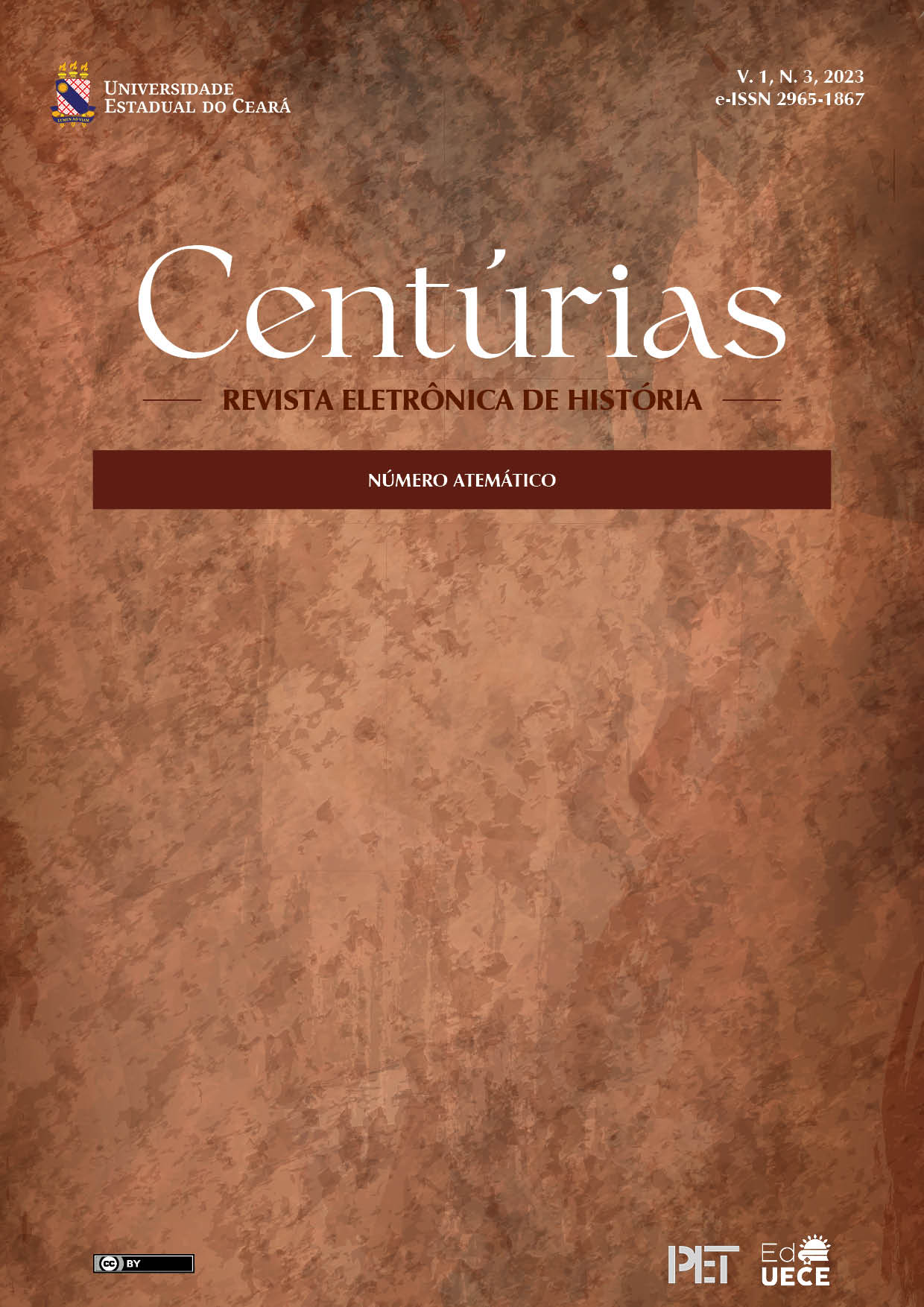Trabalhadores do barro
condição operária, precariedade e astúcias dos “Peões De Cerâmica” na região Baixo Jaguaribe, CE (1964-2010)
Palavras-chave:
Atividade ceramista, Trabalho, Precariedade, AstúciasResumo
A produção de cerâmica constitui-se como tradição nas ribeiras do Rio Jaguaribe, no Ceará, remontando as populações indígenas que habitavam esse espaço. Ao longo do tempo essa atividade foi desenvolvida por artesãos, oleiros e operários, esses últimos no âmbito das fábricas de telhas e tijolos que surgiram a partir da década de 1960. Utilizando como fontes relatos orais de ex-operários do setor ceramista, além de processos trabalhistas, esse texto tem por objetivo refletir sobre as experiências dos peões de cerâmica, forma como são comumente chamados esses trabalhadores. Entre outras informações, essas duas tipologias de fontes expõem a negação de direitos e exploração, reconstituem as funções que os sujeitos desempenhavam, as jornadas exaustivas e condições do ambiente de trabalho. Nesse contexto procuramos analisar a precariedade que se apresentava nas condições materiais de trabalho ou na fragilidade dos vínculos informais, assim, refletimos sobre as formas de exploração, além das diversas circunstâncias nas quais a saúde e a integridade do corpo eram colocadas em risco. Por fim, registramos as formas como esses trabalhadores davam respostas a tais situações, seja através de astúcias no cotidiano da fábrica ou reclamando direitos na Justiça do Trabalho.
Referências
CASTRO, A.; COSTA, A.; NETO, J.; MORAIS, J.; SALES, V. Expedição científica ao alto curso do Rio Jaguaribe (Ceará): identificação da nascente do possível maior rio temporário do mundo. Caderno de Geografia, v 30, n63, 2020. Disponível em: <http://seer.pucminas.br/index.php/geografia/article/view.> Acesso em: 14 ago. de 2023.
MARX, K. O capital, livro I. Tomo I. São Paulo: Abril cultural, 1967 e 1987.
MENDES, Francisco de Assis. O Barro de cada dia: oleiros e operários da atividade ceramista no distrito de Flores, CE. (1981 – 1990). Dissertação submetida ao Curso de Mestrado Acadêmico em História e Culturas da Universidade Estadual do Ceará, como requisito para a obtenção do grau de mestre em História. UECE, 2012.
MEIRY, José Carlos Sebe Bom. História oral: como fazer, como pensar / José Carlos Sebe Bom Meiry, Fabíola Holanda. 2 ed. – São Paulo; Contexto, 2010.
POLLAK, Michael. Memória e Identidade Social. Estudos Históricos, Rio de Janeiro, vol. 5, n. 10, 1992, p. 200-212.
SANTOS, Milton. “Metrópole. A força dos fracos é seu tempo lento”. In: SANTOS, Milton. Técnica, espaço e tempo. Globalização e meio técnico-científico-informacional. São Paulo, Editora Hucitec, 1994.
SAYAD, Abdelmalek. A Imigração ou os Paradoxos da Alteridade / Abdelmalek Sayad; prefácio Pierre Bourdieu; trad. Cristina Marachco. – São Paulo: Editora da Universidade de São Paulo, 1998.
SOARES, Hidelbrando dos Santos. Agricultura e reorganização do espaço: A rizicultura irrigada em Limoeiro do Norte. CE. Dissertação apresentada no Curso de Mestrado em Geografia da UFPE. Recife. 1999.
SOMBRA, Audiana da Silva F. A exploração do Trabalho infantil em Russas nas cerâmicas nas comunidades de Ingá e Poço Redondo. Monografia apresentada ao Curso de Licenciatura em História. Limoeiro do Norte. FAFIDAM - UECE. 2003
ULISSES, Ivaneide Barbosa. EMBRAPA, INPI e Queijaribe: formação e diretrizes para a produção e comercialização do queijo coalho de Jaguaribe. CENTÚRIAS – Revista Eletrônica de História, Limoeiro do Norte –CE, v.1, n.2, p. 100-119, jan./mar. 2023. Disponível em: <https://revistas.uece.br/index.php/centurias.>. Acesso em: 14 ago. de 2023
VIDAL, Laurent. O tempo encantado ou as astúcias dos homens lentos – Um “hipócrita” diálogo com Michel de Certeau. In: Rev. antropol. (São Paulo, Online) | v. 61 n. 2: 40-54 | USP, 2018. Disponível em:< https://www.revistas.usp.br/ra/article.>. Acesso em: 7 ago. de 2023
Downloads
Publicado
Como Citar
Edição
Seção
Licença
Copyright (c) 2023 Francisco de Assis Mendes

Este trabalho está licenciado sob uma licença Creative Commons Attribution 4.0 International License.








